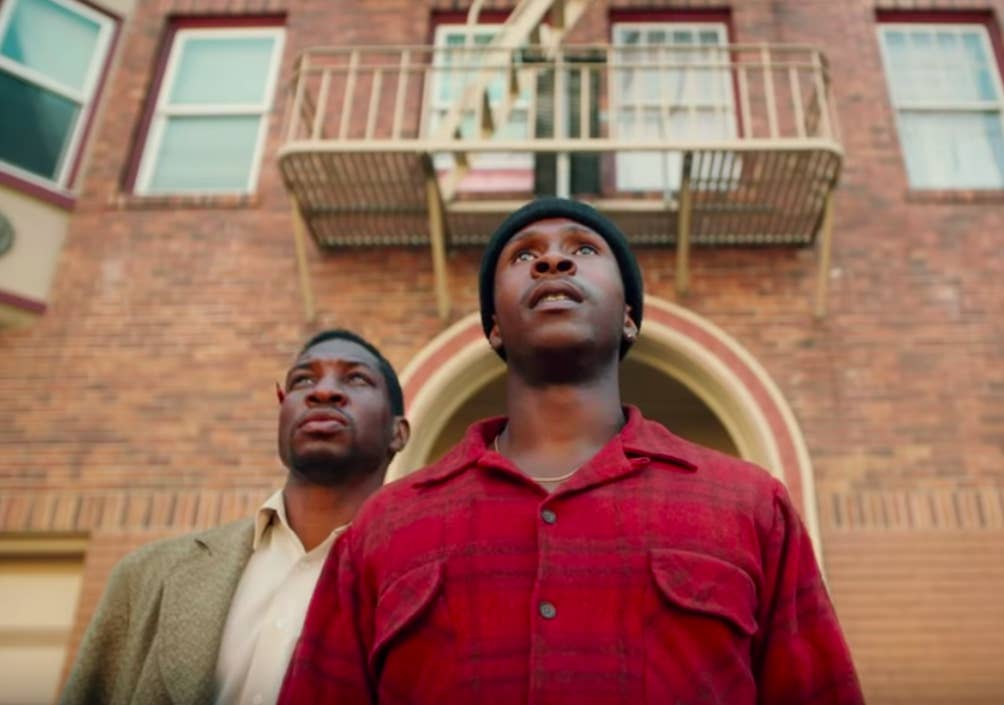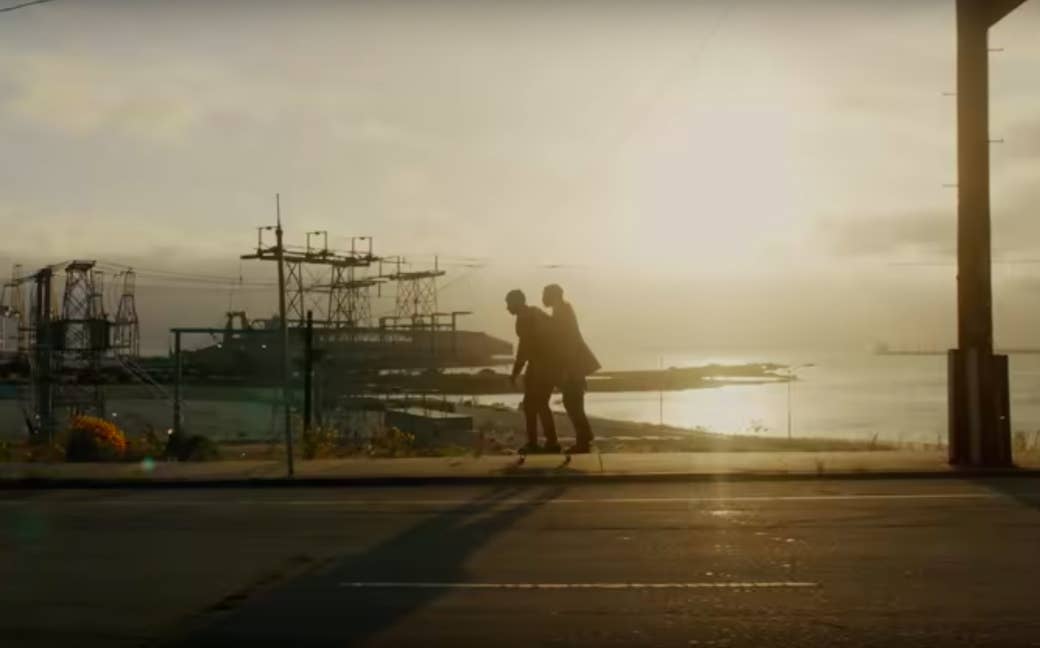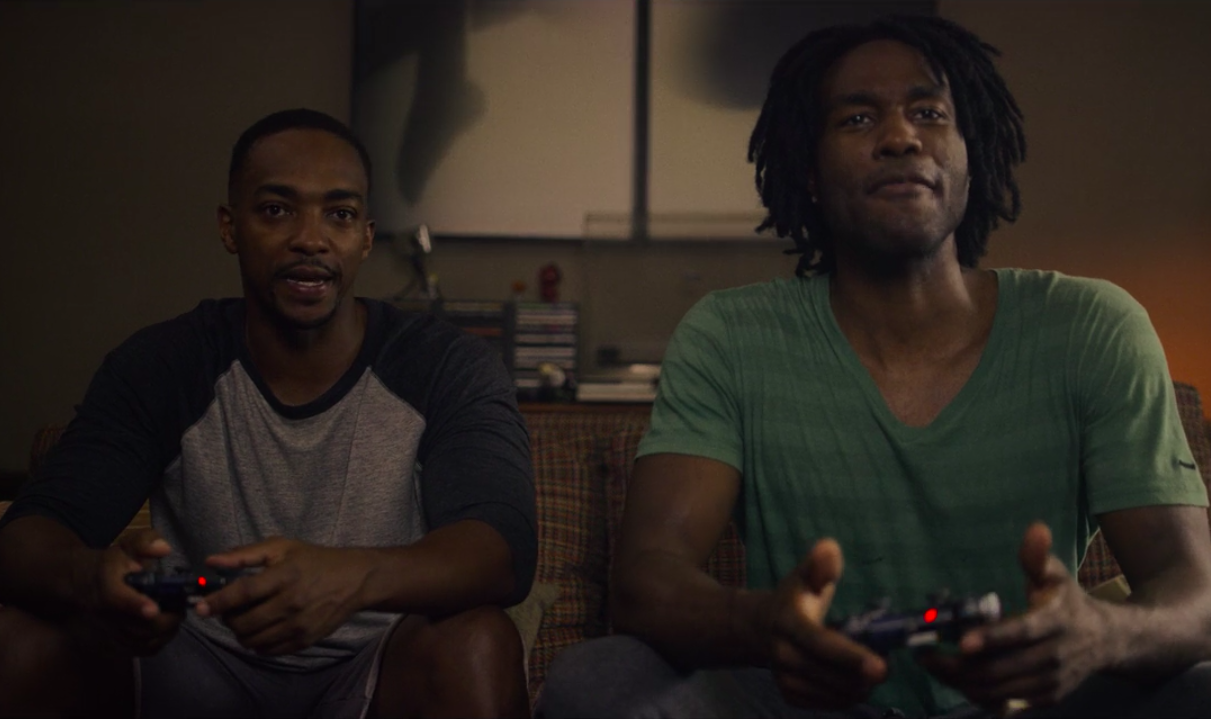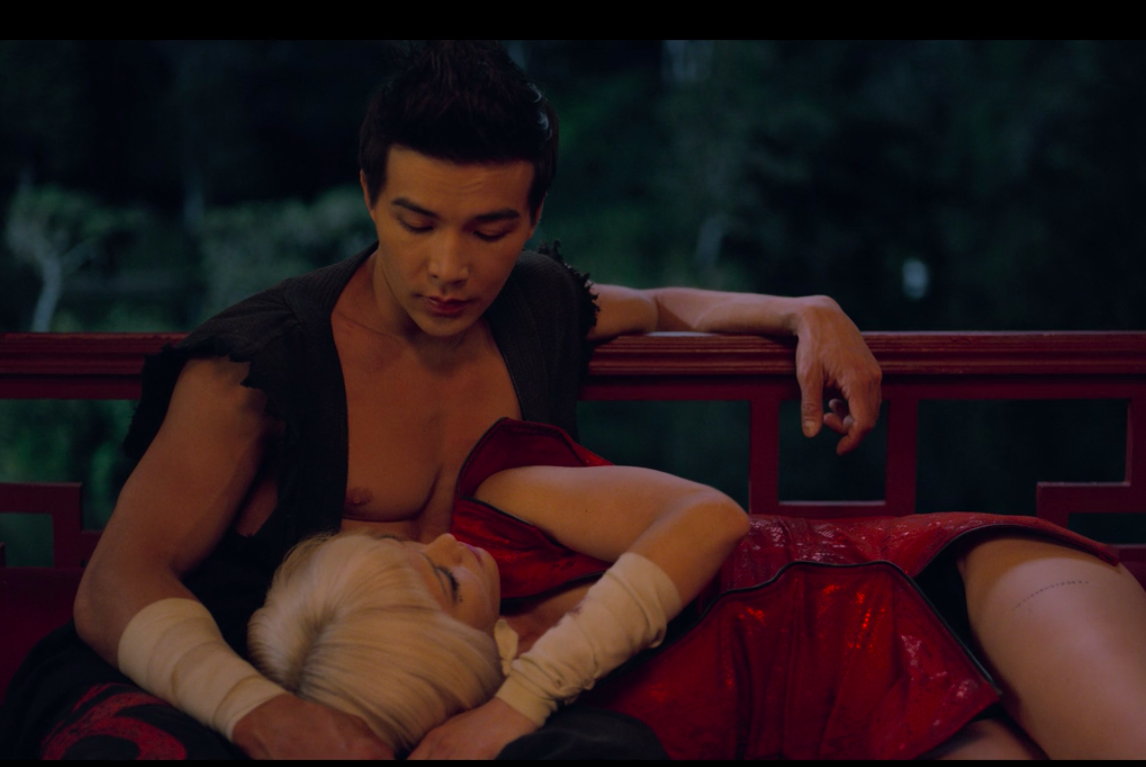
There’s a moment in Joe Talbot’s new movie The Last Black Man in San Francisco that lingers. A group of black men, all heavily inked tough guys, are gathered outside a house. The movie’s main character Jimmie (Jimmie Fails), a restless, itinerant twentysomething, approaches this group with his best friend, Montgomery, or “Mont” (Jonathan Majors), in tow. The group, which habitually mocks Jimmie and Mont for their intimate friendship, seems especially tense today. There’s a current of unease as one character explains to Jimmie that someone close to all of them has died. Words are exchanged and Jimmie barks angrily, “This was your fault! He was my fucking friend too!”
The tension mounts as the others ask how the bearer of this bad news is going to respond to Jimmie’s charge. He approaches Jimmie, their chins almost touching. It’s quiet. Then his head falls on Jimmie’s chest and he bursts into tears. Jimmie seems shocked for a moment, then puts his arms around him. It’s a disarmingly tender moment, one that caused the audience at the screening I attended to exhale audibly.
In the Q&A that followed the screening, moderator Darnell Moore mentioned that it still feels rare to see such portrayals of black masculinity, of black male friendship as something tender and sweet, angry but also vulnerable. Other cast members, scene-stealers Tichina Arnold and Rob Morgan, agreed.
I thought again of that moment after watching “Striking Vipers,” the most memorable installment of the otherwise lackluster fifth season of Netflix’s Black Mirror. The episode stars Anthony Mackie and Yahya Abdul-Mateen II as two old friends whose shared love of video games takes a carnal turn through virtual reality. And while the screenplay wasn’t necessarily written for two black men, the show’s casting turns it into an interesting, flawed exploration of black male intimacy.
Mackie plays Danny, a brooding and vaguely unsatisfied office worker living the suburban dream with a nice house, a son, and loving wife named Theo (Nicole Beharie). His old college buddy Karl (Abdul-Mateen) shows up at his 38th birthday party with a gift — an updated, immersive VR version of a video game they used to play together when they were roommates. When they log on from their respective living rooms as sexy avatars in the game (a buxom blonde named Roxette for Karl, and Lance, a muscular hearthrob dude, for Danny) they start off fighting but end up making out and later having sex. Soon enough, both friends are staying up late, night after night, to virtually fuck — and the pleasures of their digital affair threaten to derail Danny’s home life.
Through their characters, Black Mirror and The Last Black Man in San Francisco offer contrasting explorations of what black male friendship can look like. In Last Black Man, Jimmie and Mont occasionally field anti-gay comments about their relationship, but they are secure enough in their platonic love for each other that they feel no need to respond with overly aggressive displays of heterosexuality.
The friendship between Karl and Danny in Black Mirror, meanwhile, is more fraught, and more overtly gay panicky. They have trouble expressing how they feel, and when they start having virtual sex, that becomes even harder. “Are we gay now?” Karl jokes at one point. That discomfort between them undercuts the potentially radical implications of the episode, but in a world where a simple photograph of two straight black men displaying affection for each other can still cause a furor, both mediums are a fascinating glimpse at the stakes and complications of black male intimacy.

The Last Black Man in San Francisco does a better job getting its core message about black masculinity across. Based in part on San Francisco native Jimmie Fails’ real life, the movie follows Jimmie and Mont as they scheme to fix up and eventually inhabit a beautiful Victorian house Jimmie once lived in as a child, now on the market in a rapidly gentrifying, historically black part of San Francisco.
It’s clear from the very beginning of the movie that Mont and Jimmie’s friendship is unorthodox. They are not family, but there is an obvious brotherhood between them. Jimmie lives with Mont and his grandfather (Danny Glover) in a tiny house far on the outskirts of the city; they share a room, with Mont on a twin bed and Jimmie on a cot. In one early, glorious montage, tired of waiting for the bus, they both ride on Jimmie’s skateboard, skating in rhythm together on the streets of picturesque San Francisco, Mont’s hands resting on Jimmie’s shoulders. They are mutually supportive of each other — Mont aspires to be a playwright, and so Jimmie asks about his writing and eventually offers up the house as a venue for Mont’s first play. Mont respects Jimmie’s love for the Victorian; he’s always on the lookout when Jimmie is fixing up the exterior and later goes toe-to-toe with the slimy realtor who wants to sell the house.
Their friendship invites mockery from the group of men who hang around outside Mont’s building (the lack of explanation for why they spend time there, or who they are, is one of the film’s weaknesses). “I heard these niggas take showers together,” says one of them. “Fruity,” says another guy named Kofi. Kofi later shows up at the house Jimmie and Mont have now lovingly furnished, and all three of them end up smoking a joint in the sauna, sitting and reminiscing in their underwear. It’s a scene remarkably devoid of any sort of eroticism. This is what friendship can look like, the film suggests — no need for machismo posturing.
Later, after an especially vicious verbal ribbing from the gang outside Mont’s house, all the more hurtful because Kofi joined in, Mont sketches the men in his notepad as Jimmie whips some raw eggs for dinner. The camera pans to a heterosexual Asian couple in the house across the street, doing the same thing. If it’s a moment meant to undermine their friendship — to suggest something vaguely gay or at the very least Bert and Ernie–ish about their relationship — neither Jimmie nor Mont seem fazed. They recognize and value their friendship for what it is: loyal, supportive, and loving.

By contrast, in Black Mirror’s “Striking Vipers,” it’s the two central characters’ inability to actually express how they feel about each other that’s the driving source of the episode’s tension and confusion, to such an extent that it becomes an almost comical send-up of male stereotypes.
Much fuss has been made over men’s alleged inability to make meaningful friendships. Convention tells us that men, and straight men in particular, are more likely to have friends that they do stuff with — like watch sports or play video games — while women are more likely to confide in their friends and share their emotions. According to this logic, men are verbally stunted creatures, unable to engage in meaningful conversations or articulate how they feel about one another. Black Mirror seems happy to play up those dynamics.
This is what friendship can look like, the film suggests — no need for machismo posturing.
When we first meet Danny, he’s chatting up his girlfriend Theo at a bar, pretending to be a stranger to spice up their sex life before Karl and his girlfriend Daisy meet up with them. Later that night, after some vigorous sex with Theo, Danny heads to their living room to indulge in a few rounds of the console game Striking Vipers. The undercurrent of homoeroticism, couched in macho shit-talking, is there from the get-go; Karls tells Danny he’s going “fuck his head off” as they play, and even pretends to hump Danny after Theo chastises them for making so much noise so late at night.
The episode flashes forward 11 years after that late-night video game session, and now Danny is barbecuing at his own birthday party in his backyard. He doesn’t seem to have any friends; when a couple approaches him to say hi, the conversation between Danny and the husband is ludicrously stilted.
“You like motorcycles or just bikes?” Danny asks.
“Just bikes,” the husband responds.
Do you get it? Men suck at talking! (This is in fact something Theo, now Danny’s wife, literally tells Danny after the party.) When Karl shows up at the party, even though Danny and Karl are old friends, they are incapable of having a substantive conversation, turning to wisecracks and jokes about shaved ball sacks.
And when they do finally consummate their attraction in an updated VR version of Striking Vipers — the closest they get to having a real conversation about it is when Danny-as-Lance asks Karl-as-Roxette what it feels like to have sex as a woman, with Roxette resting in Lance’s lap. (“It’s crazy. ... Like, one’s a guitar solo — the other’s a whole fucking orchestra,” Roxette says. Oh...kay.)

Danny eventually ends the digital affair, and after a tense birthday dinner a year later with Theo and Karl (Danny didn’t know Theo had invited him), Karl and Danny play the game again for the first time in many months. “I love this,” says Karl-as-Roxette. “I love you,” she whispers, and Danny-as-Lance is suddenly thrown off.
“No, no, no,” Danny-as-Lance says.
“I don’t know where that came from,” Karl-as-Roxette confesses.
“Where the fuck is this going?”
That intimation of affection convinces Danny that he and Karl have to meet later that night — in real life — to see if what they have is “real.” After an awkward kiss, they determine that they aren’t actually attracted to each other. And so “Striking Vipers” concludes oddly, in a kind of pseudo sexually liberated way. With full blessings from his wife, Danny continues going on scheduled VR sex dates with Karl, while Theo hits the town sans her wedding ring.
In an interview with the Hollywood Reporter, even Charlie Brooker, Black Mirror’s creator, confessed that he’s not sure what the dynamic of the two men’s friendship actually is. “What I find quite fascinating about it is that I still don’t really know where I come down on that episode, whether I think they’re having a same-sex relationship or what,” he said.
Are they only in it for the sex? Do they have anything to talk about beyond that? Were they lying about not feeling anything in real life? The episode leaves all these questions unanswered. The ambiguity could be interesting, but it ends up feeling more like a lazy cop-out. We have a lot of potentially compelling ideas but are unable to connect the dots, so we leave them up to you, viewer, Brooker, who’s credited with writing the episode, seems to be saying.
The characters’ blackness, too, is never remarked on — even though, as Abdul-Mateen noted in a separate interview with the Hollywood Reporter, it’s still pretty noteworthy that two black men were cast to explore this dynamic in particular: “It’s important. We need more conversations about masculinity. I remember wondering how this story was going to play in a barber shop.”
Abdul-Mateen is not wrong. In 2016, a Vanity Fair photograph of director Ryan Coogler and Michael B. Jordan standing next to each other, Jordan’s hand resting on Coogler’s head, sparked a series of anti-gay comments when it was reposted on blogger B. Scott’s Facebook page. “The demasculation continues,” read one comment. “No self-respecting heterosexual males would pose like this,” read another. The post, which was eventually deleted, ended up sparking a Twitter hashtag #masculinitysofrail. The blogger Son of Baldwin reposted the photo with this take:
“Apparently, this photo of actor Michael B. Jordan and director Ryan Coogler from a Vanity Fair shoot is disturbing a number of people because it portrays an intimacy between men — between black men — that the rules of patriarchal masculinity, queerantagonism, cisheterosexism, ashiness, and the Male Gaze disallow.”
In other words, we’re still not accustomed to black male friendship without a sexual subtext. Black Mirror suggests that it’s not quite possible, that perhaps there are no ways two men can have a healthy, intimate friendship without secretly wanting to fuck each other as video game characters. The Last Black Man in San Francisco, by contrast, is less pressed about perceived queerness and, in keeping with the generally surrealist tone of the film, the friendship between Jimmie and Mont feels singular. It suggests that two black men really can love each other in a platonic way — no need for any panic, gay or otherwise. ●
